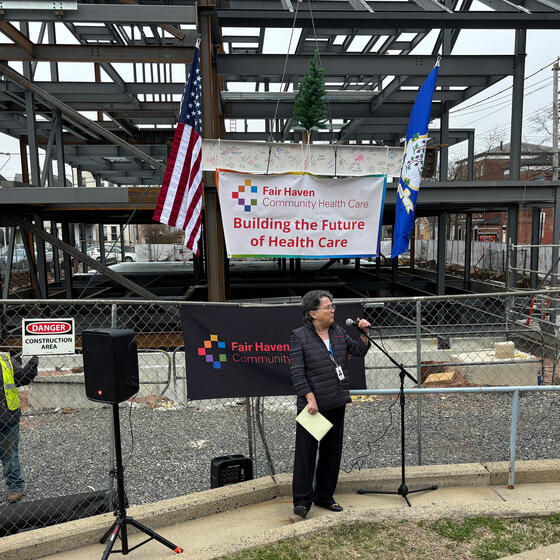Healthcare
Can a Clinic Comply with Trump’s Executive Orders Without Leaving Patients Behind?
For more than 50 years, New Haven’s Fair Haven Community Health Care has provided care to immigrants and other vulnerable populations. We talked with CEO Suzanne Lagarde ’14 about how the organization is grappling with federal executive orders and budget cuts that threaten its mission.

Can effective leadership make us healthier and wealthier?
Poor healthcare can do more than degrade quality of life; it can have a negative impact on a country's economic well-being. Elizabeth Bradley, professor of public health and director of the Yale Global Health Initiative, argues that when leaders make choices to improve public health they can foster virtuous cycles improving both health and economics. She also discusses the challenges facing China, the world's most populous nation, as it seeks to improve its healthcare system.
What are your options in the health insurance exchanges?
The insurance exchanges at the center of healthcare reform will open for business later this year. Alongside existing for-profit insurers, the exchanges will include new nonprofit insurers called Consumer Oriented and Operated Plans (CO-OPs). Allison Silvers '90, chief operating officer of a CO-OP sponsored by the Freelancers Union in New York, discusses the health insurance exchanges and what it takes to create a new kind of insurer.
How will Obamacare change healthcare?
A recent spate of news gives hints about whether the Affordable Care Act is likely to be successful in improving healthcare coverage and quality. Robert Galvin, CEO of Equity Healthcare, a firm that manages health insurance for more than 300,000 people, talks about how he sees the law changing the health insurance market—and the importance of continuing to innovate on all levels.
Medical School Gift Restriction Policies Affect Doctors' Prescribing Behavior
Professor Marissa King compared the prescribing patterns of doctors who graduated before and after their medical schools introduced conflict-of-interest policies that restrict industry gifts. Her research showed that doctors who experienced gift restrictions during medical training are less likely to prescribe newly marketed medications.
Study Maps Mental Health Medication Use in the U.S.
Professor Marissa King mapped the geographic patterns of the use of antidepressants, antipsychotics, and stimulants across the United States. She identified large regional clusters, centered on Tennessee, where use of these drug classes were elevated.
What lies ahead for healthcare reform?
Dr. Howard Forman, Professor of Diagnostic Radiology and director of the MBA for Executives: Leadership in Healthcare Program, explains how the Affordable Care Act is expected to affect overall healthcare spending, as well as state and federal budgets. He also discusses the reality behind some of its most controversial provisions.
How will healthcare reform change the economy?
The highly contentious healthcare reform act passed in 2010 is being implemented over the next several years. Businesses, ranging from mom-and-pop operations to global corporations, are struggling to understand how it will affect them. Two healthcare experts with direct experience of policymaking and business decision making discuss what’s ahead.
Can design thinking reshape an esteemed institution?
As chair of medicine at Mayo Clinic, Dr. Nicholas LaRusso started a small experiment to see whether teams of doctors and designers could redesign the way healthcare is experienced and delivered. After introducing the design world's rapid prototyping approach to test potential changes to waiting rooms or integration of technology, he found himself heading the Mayo Clinic Center for Innovation promoting innovation throughout the institution.
Do we need a "World Food Council"?
Hunger, obesity, and environmental damage from agricultural activity share a number of common roots. This led Yale food expert Kelly Brownell to call for a coordinated effort to find world solutions to these issues.
Is x sustainable?
Will medical costs in the United States swamp our ability to pay? Can information technology continue to get faster, lighter, and more effective? Will global trade go on increasing and generating wealth? Asking if a system is sustainable forces one to project far into the future — and then to look back at the present from that vantage.
